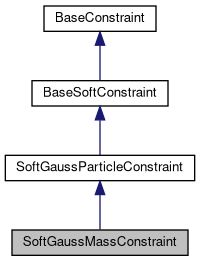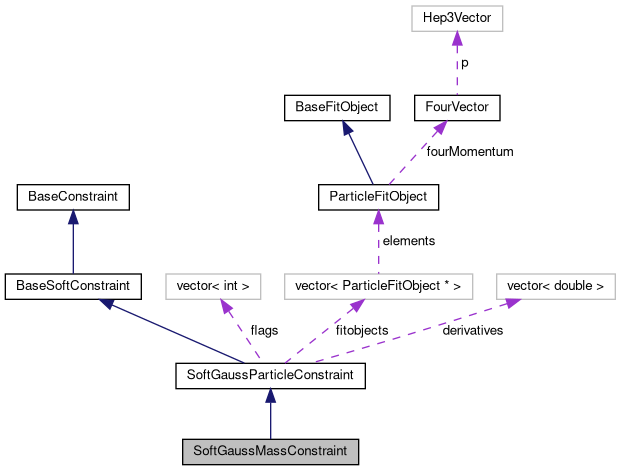 |
Belle II Software
release-08-01-10
|
 |
Belle II Software
release-08-01-10
|
Implements constraint 0 = mass1 - mass2 - m. More...
#include <SoftGaussMassConstraint.h>


Public Member Functions | |
| SoftGaussMassConstraint (double sigma_, double mass_=0.) | |
| Constructor. More... | |
| virtual | ~SoftGaussMassConstraint () |
| Virtual destructor. | |
| virtual double | getValue () const override |
| Returns the value of the constraint function. | |
| virtual void | getDerivatives (int idim, double der[]) const override |
| Get first order derivatives. More... | |
| virtual double | getMass (int flag=1) |
| Get the actual invariant mass of the fit objects with a given flag. More... | |
| virtual void | setMass (double mass_) |
| Sets the target mass of the constraint. More... | |
| virtual void | setFOList (std::vector< ParticleFitObject * > *fitobjects_) |
| Adds several ParticleFitObject objects to the list. More... | |
| virtual void | addToFOList (ParticleFitObject &fitobject, int flag=1) |
| Adds one ParticleFitObject objects to the list. | |
| virtual void | resetFOList () |
| Resests ParticleFitObject list. | |
| virtual double | getChi2 () const override |
| Returns the chi2. | |
| virtual double | getError () const override |
| Returns the error on the value of the constraint. | |
| virtual double | getSigma () const |
| Returns the sigma. | |
| virtual double | setSigma (double sigma_) |
| Sets the sigma. More... | |
| virtual void | add2ndDerivativesToMatrix (double *M, int idim) const override |
| Adds second order derivatives to global covariance matrix M. More... | |
| virtual void | addToGlobalChi2DerVector (double *y, int idim) const override |
| Add derivatives of chi squared to global derivative matrix. More... | |
| void | invalidateCache () const |
| Invalidates any cached values for the next event. | |
| void | test1stDerivatives () |
| void | test2ndDerivatives () |
| double | num1stDerivative (int ifo, int ilocal, double eps) |
| Evaluates numerically the 1st derivative w.r.t. a parameter. More... | |
| double | num2ndDerivative (int ifo1, int ilocal1, double eps1, int ifo2, int ilocal2, double eps2) |
| Evaluates numerically the 2nd derivative w.r.t. 2 parameters. More... | |
| int | getVarBasis () const |
| virtual const char * | getName () const |
| Returns the name of the constraint. | |
| void | setName (const char *name_) |
| Set object's name. | |
| virtual std::ostream & | print (std::ostream &os) const |
| print object to ostream More... | |
Protected Types | |
| enum | { VAR_BASIS = BaseDefs::VARBASIS_EPXYZ } |
| typedef std::vector< ParticleFitObject * > | FitObjectContainer |
| Vector of pointers to ParticleFitObjects. | |
| typedef FitObjectContainer::iterator | FitObjectIterator |
| Iterator through vector of pointers to ParticleFitObjects. | |
| typedef FitObjectContainer::const_iterator | ConstFitObjectIterator |
| Constant iterator through vector of pointers to ParticleFitObjects. | |
Protected Member Functions | |
| virtual bool | secondDerivatives (int i, int j, double *derivatives) const override |
| Second derivatives with respect to the 4-vectors of Fit objects i and j; result false if all derivatives are zero. More... | |
| virtual bool | firstDerivatives (int i, double *derivatives) const override |
| First derivatives with respect to the 4-vector of Fit objects i; result false if all derivatives are zero. More... | |
Protected Attributes | |
| double | mass |
| The mass difference between object sets 1 and 2. | |
| FitObjectContainer | fitobjects |
| The FitObjectContainer. | |
| std::vector< double > | derivatives |
| The derivatives. | |
| std::vector< int > | flags |
| The flags can be used to divide the FitObjectContainer into several subsets used for example to implement an equal mass constraint (see MassConstraint). | |
| double | sigma |
| The sigma of the Gaussian. | |
| char * | name |
Related Functions | |
(Note that these are not member functions.) | |
| std::ostream & | operator<< (std::ostream &os, const BaseConstraint &bc) |
| Prints out a BaseConstraint, using its print method. More... | |
Implements constraint 0 = mass1 - mass2 - m.
This class implements different mass constraints:
Author: Jenny List, Benno List Last update:
by:
Definition at line 45 of file SoftGaussMassConstraint.h.
|
explicit |
Constructor.
| sigma_ | The sigma value |
| mass_ | The mass difference between object sets 1 and 2 |
Definition at line 35 of file SoftGaussMassConstraint.cc.
|
overridevirtualinherited |
Adds second order derivatives to global covariance matrix M.
Calculates the second derivative of the constraint g w.r.t.
the various parameters and adds it to the global covariance matrix
We denote with P_i the 4-vector of the i-th ParticleFitObject, then $$ \frac{\partial ^2 g}{\partial a_k \partial a_l} = \sum_i \sum_j \frac{\partial ^2 g}{\partial P_i \partial P_j} \cdot \frac{\partial P_i}{\partial a_k} \cdot \frac{\partial P_j}{\partial a_l}
First, treat the part $$ \frac{\partial ^2 g}{\partial P_i \partial P_j} \cdot \frac{\partial P_i}{\partial a_k} \cdot \frac{\partial P_j}{\partial a_l} $$
Second, treat the parts $$ \sum_i \frac{\partial g}{\partial P_i} \cdot \frac{\partial^2 P_i}{\partial a_k \partial a_l} $$ and $$ \frac{\partial^2 h}{\partial g^2} \sum_i \frac{\partial g}{\partial P_i} \cdot \frac{\partial P_i}{\partial a_k} \sum_j \frac{\partial g}{\partial P_j} \cdot \frac{\partial P_j}{\partial a_l} $$
Here, $\frac{\partial g}{\partial P_i}$ is a 4-vector, which we pass on to the FitObject
| M | Covariance matrix, at least idim x idim |
| idim | First dimension of the array |
Implements BaseSoftConstraint.
Definition at line 91 of file SoftGaussParticleConstraint.cc.
|
overridevirtualinherited |
Add derivatives of chi squared to global derivative matrix.
| y | Vector of chi2 derivatives |
| idim | Vector size |
Implements BaseSoftConstraint.
Definition at line 243 of file SoftGaussParticleConstraint.cc.
|
overrideprotectedvirtual |
First derivatives with respect to the 4-vector of Fit objects i; result false if all derivatives are zero.
| i | number of 1st FitObject |
| derivatives | The result 4-vector |
Implements SoftGaussParticleConstraint.
Definition at line 191 of file SoftGaussMassConstraint.cc.
|
overridevirtual |
Get first order derivatives.
Call this with a predefined array "der" with the necessary number of entries!
| idim | First dimension of the array |
| der | Array of derivatives, at least idim x idim |
Implements SoftGaussParticleConstraint.
Definition at line 68 of file SoftGaussMassConstraint.cc.
|
virtual |
Get the actual invariant mass of the fit objects with a given flag.
| flag | The flag |
Definition at line 123 of file SoftGaussMassConstraint.cc.
|
inherited |
Evaluates numerically the 1st derivative w.r.t. a parameter.
| ifo | Number of FitObject |
| ilocal | Local parameter number |
| eps | variation of local parameter |
Definition at line 312 of file SoftGaussParticleConstraint.cc.
|
inherited |
Evaluates numerically the 2nd derivative w.r.t. 2 parameters.
| ifo1 | Number of 1st FitObject |
| ilocal1 | 1st local parameter number |
| eps1 | variation of 1st local parameter |
| ifo2 | Number of 1st FitObject |
| ilocal2 | 1st local parameter number |
| eps2 | variation of 2nd local parameter |
Definition at line 326 of file SoftGaussParticleConstraint.cc.
|
virtualinherited |
print object to ostream
| os | The output stream |
Definition at line 76 of file BaseConstraint.cc.
|
overrideprotectedvirtual |
Second derivatives with respect to the 4-vectors of Fit objects i and j; result false if all derivatives are zero.
| i | number of 1st FitObject |
| j | number of 2nd FitObject |
| derivatives | The result 4x4 matrix |
Implements SoftGaussParticleConstraint.
Definition at line 145 of file SoftGaussMassConstraint.cc.
|
inlinevirtualinherited |
Adds several ParticleFitObject objects to the list.
| fitobjects_ | A list of BaseFitObject objects |
Definition at line 83 of file SoftGaussParticleConstraint.h.
|
virtual |
Sets the target mass of the constraint.
| mass_ | The new mass |
Definition at line 140 of file SoftGaussMassConstraint.cc.
|
virtualinherited |
Sets the sigma.
| sigma_ | The new sigma value |
Definition at line 42 of file SoftGaussParticleConstraint.cc.
|
related |
Prints out a BaseConstraint, using its print method.
| os | The output stream |
| bc | The object to print |
Definition at line 114 of file BaseConstraint.h.